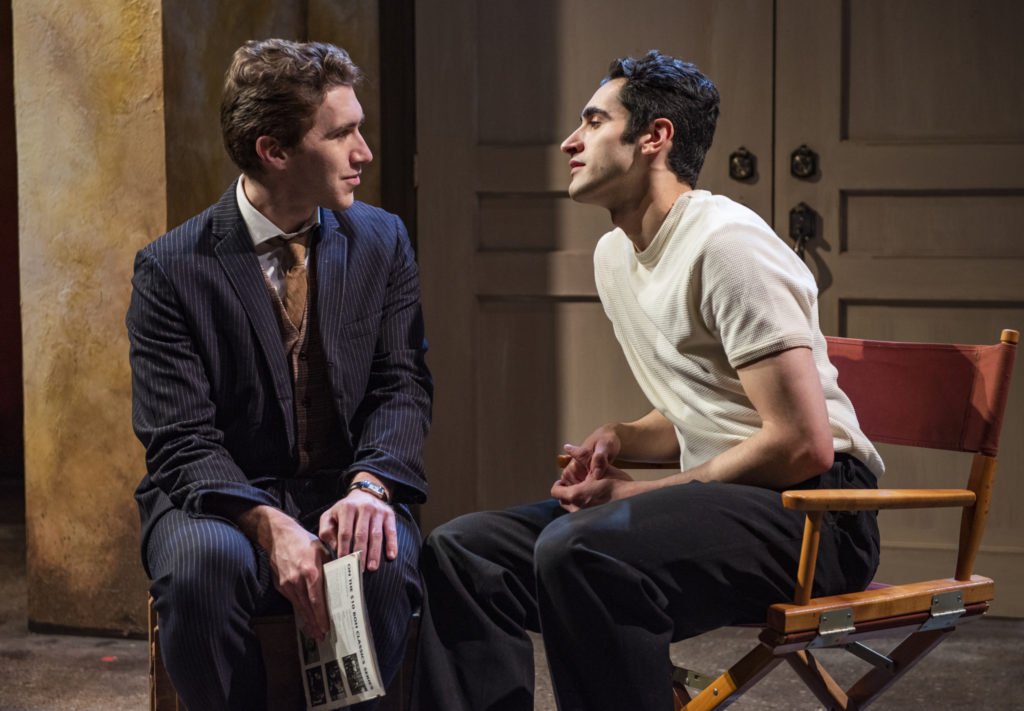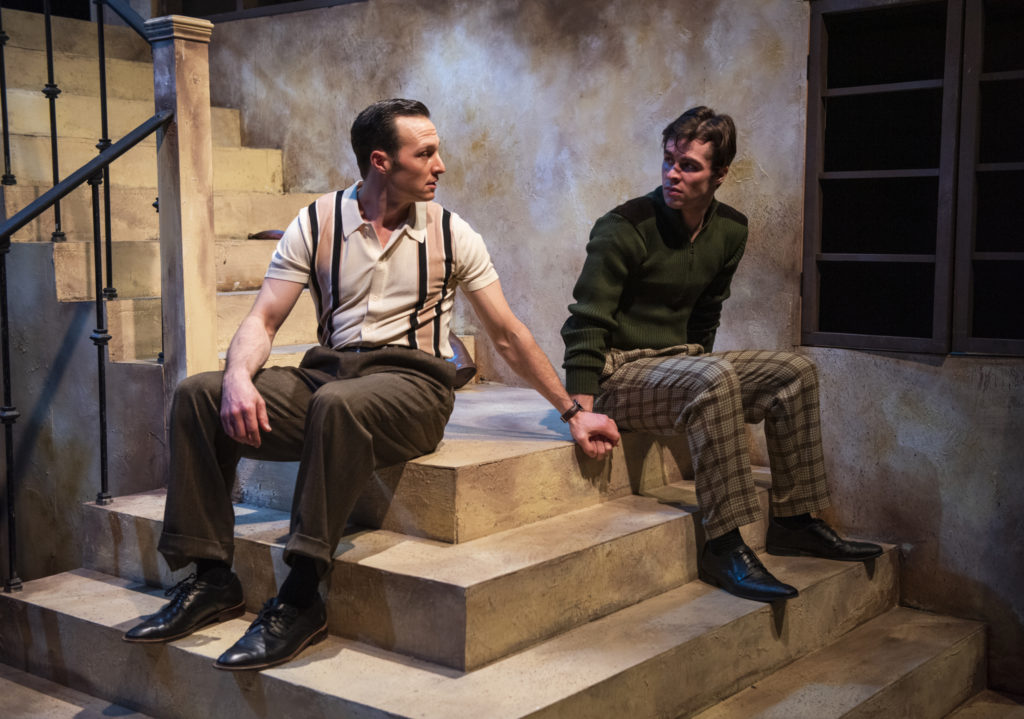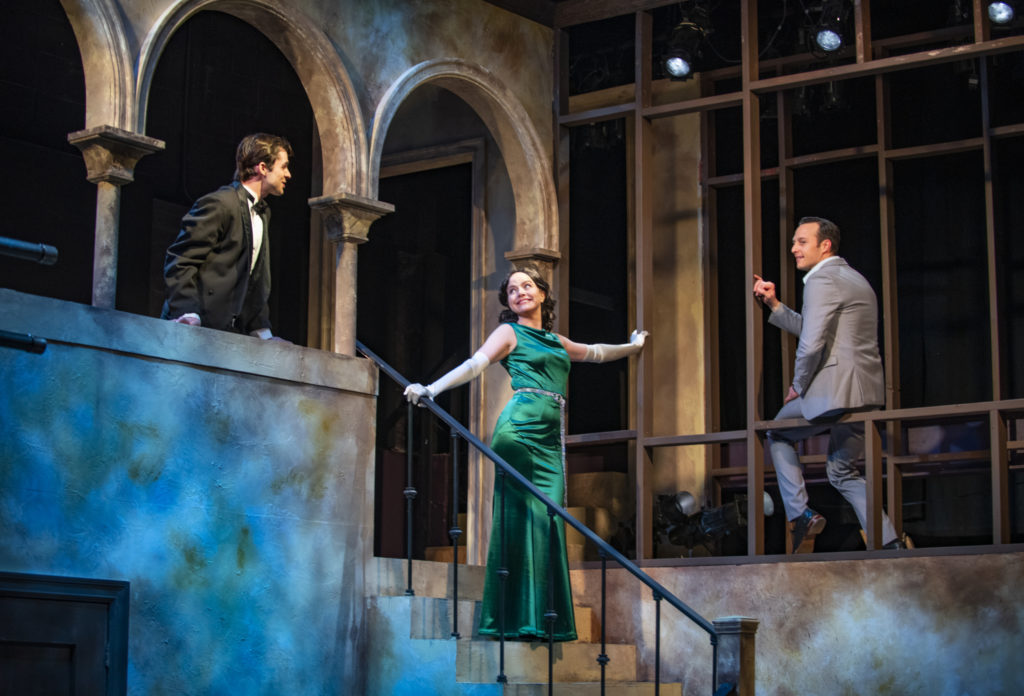
Windy City Playhouse’s look back on the life and career of Ramon Novarro, a mega star of 1920’s Hollywood who’s best remembered today for the way he died, has its struggles. It can be slow and feel vaguely forced, but the underlying truths it reminds us of hold inescapable resonance and power. Tragedy has that capacity.
Novarro’s impact on Hollywood wasn’t immediate when he arrived from Mexico in his late teens. Time and promotion generated by influential friends combined to propel his prospects. Because movies during the period were still silent, the way you looked and the kinds of fantasies you could inspire were the attributes that made the box office bulge. Novarro, whose 1925 lead in the first filming of Ben Hur stands as his greatest cinematic achievement, made it explode. Once he straddled the rocket to stardom and fame, his ride appeared endless.
Prohibition may have blanketed the rest of America, but it was unknown in the villas and mansions of Hollywood. Indulgence, even great indulgence, was simply a part of personal expression and life.
It’s that world the we’re introduced to when the lights go up on Sons of Hollywood at Windy City’s flagship location on Irving Park Rd. Novarro (Trey DeLuna) and his current lover, Billie Haines (Adam Jennings) are getting ready for a gala with their mutual bestie, Joan Crawford (Abby Lee). Also a Hollywood A-lister of the era, Haines’s language sparks with the assurance and pride of a self-made man. Someone who’s successfully used his brains as well as his looks to secure a place for himself on the ladder of success. Theirs are lives that are clandestine only on the surface. The slightest scratch would at once reveal another way of not only existing; but thriving. For Haines, it was an existence that represented freedom and rebuked any notion of shame. But for Novarro, steeped in Catholicism and allegiance to family, being gay was not so self-accepting. Unable to sustain committed relationships, preference or expedience led him to satisfy his appetite for men in other ways; often with money. Alcohol represented its own refuge. Sons of Hollywood portrayal of these outlets and dependencies were clear; but lacked the kind of depth that would suggest consequences.

Despite the different paths Novarro and Haines traveled to satisfy their physical and emotional needs, both were content and relished the lives they’d carved out for themselves. With no prior knowledge of its impending announcement, the release of the Motion Picture Production Code in 1930 hit them with tsunami force. An expansive blanket of film censorship that prohibited everything from nudity of any type to the depiction of racial mixing, one of code’s primary goals was to cleanse Hollywood of homosexuals. By that time, Novarro had become one of the few actors who made the successful transition from silent movies to talkies. Haines was equally viable in his career and firmly ensconced in a long-term relationship with a sailor he met in New York and brought home with him to LA. His more than 40-year relationship with Jimmie Shields (Kyle Patrick) was so successful it would come to be considered one of the “happiest marriages in Hollywood”.
Sons of Hollywood shows how both men weathered and endured the code’s cataclysmic upheaval. It collapsed Novarro’s exalted status and reduced him to playing much smaller parts and doing regional theater. Haines, ever the pivot master, emerged as a gifted interior designer who transformed friends into a client base before eventually expanding his enterprise to include the elite families of commerce and politics.

Looking almost 100 years in hindsight, stories like Novarro’s show us how far our culture has come. Today, society’s absorption of the gay experience has now been codified into the rule of law. But even with this progress, people living counter normative lives are still paying the ultimate price for being who and what they are. Sons of Hollywood is recommended because it keeps what constitutes progress in perspective.
Adam Jennings as Haines and Ms. Lee in her portrayal of Joan Crawford were wonderful in their depiction of resilience, defiance and resolve. To stay on top, those characteristics are indispensable. Loyalty was also in high relief. But thanks to Max Stewart, who played, among other roles, Herbert Howe, a journalist and publicist who became one of Novarro’s lovers; we saw and heard the kind of anguish that motivates courageous decisions. When he confronts Novarro with his inability to embrace the moral legitimacy of their relationship, the audience was rewarded with the kind of sincerity and passion that would have benefited more of the production.
Billed as a play with music, Sons of Hollywood’s lightness helps to emphasize the other worldly detachment from care we associate with the film industry. Here, the strategy may have been too successful by undermining some of the story’s gravity. Where it leads however will remain a tragic fascination.
Sons of Hollywood
Windy City Playhouse
3014 W. Irving Park Rd.
Chicago, IL 60618
www.Windycityplayhouse.com